Resource Center for EMI
Introduction
The Resource Center for EMI (RCEMI) at National Taiwan Normal University (NTNU) was founded in 2022, with its core mission being to help higher education institutions across Taiwan to establish and promote EMI (English as a Medium of Instruction) professional development programs. Supported by NTNU’s leading educational research and success in internationalization, RCEMI will create a forum for all Taiwanese universities and colleges to share bilingual education experiences and foster a common goal for all.
RCEMI is committed to training EMI faculty and teaching assistants (TAs) to enhance the efficacy of bilingual teaching, promoting resource sharing and field-based cross-university collaborative partnership in all institutions. The key services we provide includes the following:
- Cross-University Support System
- EMI Faculty Professional Development Program
- Inter-University EMI Community of Practice
- EMI TA Professional Development Program
- Off-site to UT Austin
Establishment of Cross-university Support System
We have collected a name list of EMI instructional leaders from various disciplines to accommodate the needs of our partners. In addition, we facilitate discussions and communications among the beacon universities and colleges of the BEST Program, as well as other institutions, to identify challenges and deliberate possible solutions collectively. Achievement forums are also held for different institutions to share their successful stories and lessons learned with respect to EMI strategies, teacher professional development, EMI curriculum planning and evaluation, and curriculum effectiveness assurance approaches.
Professional Development for EMI Faculty
RCEMI pays attention to the needs of educators, responds to diversified EMI instructor training courses, plans domestic and overseas training, and develops EMI teacher training courses and certifications developed by NTNU to enhance the EMI curriculum development and teaching transformation capabilities of higher education teachers, and improve the effectiveness of EMI teaching. Our hybrid courses cover three significant areas involving a total of 6-20 hours of videos and in-person workshops.
Professional Learning Community of EMI Instructors
RCEMI offers grants of up to NT$60,000 to institutions seeking to build communities of practice among EMI faculty members from different universities. These communities of practice afford members the opportunity to exchange pedagogical ideas and collaborate on curriculum design and will serve as support networks for EMI teaching faculties across Taiwan.
Online Training Program for EMI Teaching Assistants
Our training program aims to develop understanding of EMI TA to keys to successful EMI learning and effective class management. This will allow these teaching assistants to prepare for EMI teaching and learning practices. By the end of their training, EMI TAs will understand their roles and effective strategies in EMI courses.
Current Achievements
Since starting to promote the Program on Bilingual Education for Students in College (BEST), National Taiwan Normal University (NTNU) has accumulated a considerable number of achievements in the EMI Professional Lecturer Development and Teacher Assistant (TA) Training programs. NTNU not only has abundant experiences in cross-university community management but also has numerous faculty members across various specializations who have completed EMI training and served as Mentors. The EMI TA digital training courses themselves are also diverse and of high quality. In addition, NTNU has been invited to share its experiences in promoting bilingual education to post-secondary institutions including the Center for Bilingual Education of National Taiwan University, the Center for Teaching and Learning Development of National Taipei University of Education, Chung Shan Medical University, National Chung Cheng University, Chung Yuan Christian University, Tzu Chi University, National Pingtung University of Science and Technology, National University of Tainan, and Kainan University. We hope to continue sharing lecturer training resources with other universities as we learn and grow together.
As a member of the National Taiwan University System, NTNU has allied with the National Taiwan University and the National Taiwan University of Science and Technology to establish a course-sharing system. In the future, we will be working with neighboring universities to determine a suitable mechanism for the sharing of EMI courses and resources. Furthermore, for our upcoming launch of NTNU Online, we have amassed digital English teaching courses in various specializations from universities nationwide. We hope that this will serve as a foundation for sharing digital course resources from our Regional Resource Center for Bilingual Education in the future.
Organization
The Resource Center for EMI (RCEMI) has appointed one Chief Executive Officer, 2 Vice Executive Officers, 3 Postdoctoral Fellows, and 3 Project Managers. Their office tasks are as follows:
Planning and implementation of 5 major programs: Cross-University Support System Establishment, EMI Professional Development, Professional Learning Community of EMI Instructors, EMI TA Training, Off-site UT Austin.
- to develop and promote EMI training courses and events to colleges and universities nationwide.
- to coordinate subsidization and assist in system establishment as well as external affairs for promoting EMI training.
- to regularly review and check the progress of promotions, performance indicators, and subsidization.
RCEMI adopts a dual-track approach to program promotion and development. On top of sharing resources and supporting EMI teachers and TAs in training, RCEMI is instrumental in developing course modules. RCEMI aims to effectively assist higher education institutions in Taiwan to foster English lecturers and TAs as well as reap benefits from professional bilingual teaching resource sharing and cross-university collaboration.
Resource Center for EMI (RCEMI)
TEL: (02)-7749-5904 | (02)-7749-5905 | (02)-7749-5922
Office hours: 8:30 a.m. – 5:30 p.m.
Email: rcemi@deps.ntnu.edu.tw

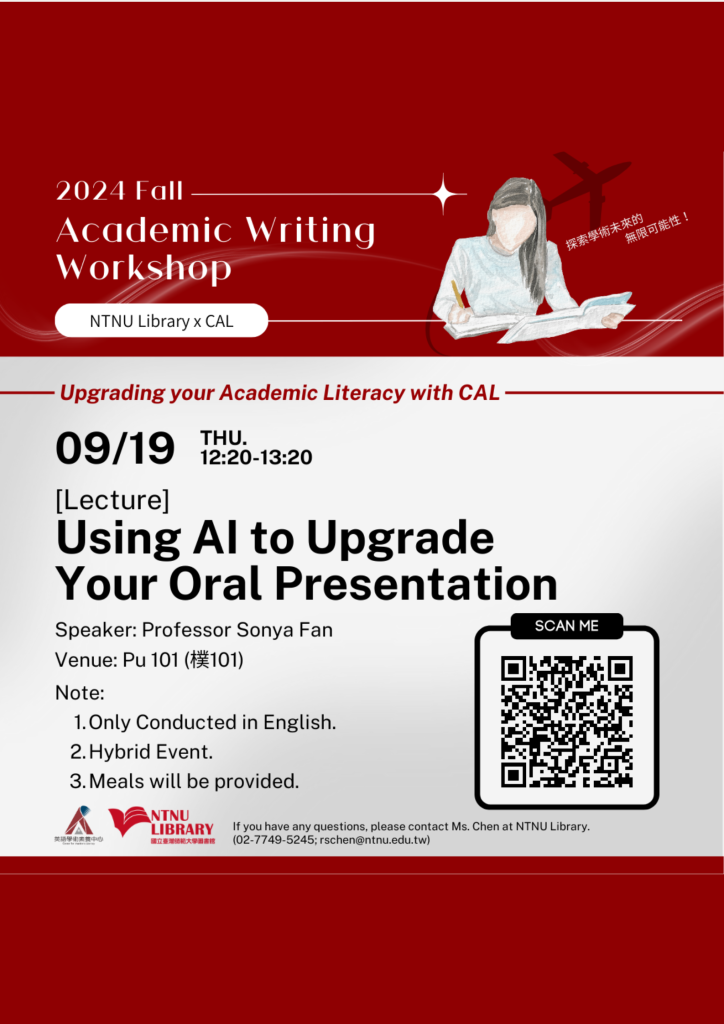
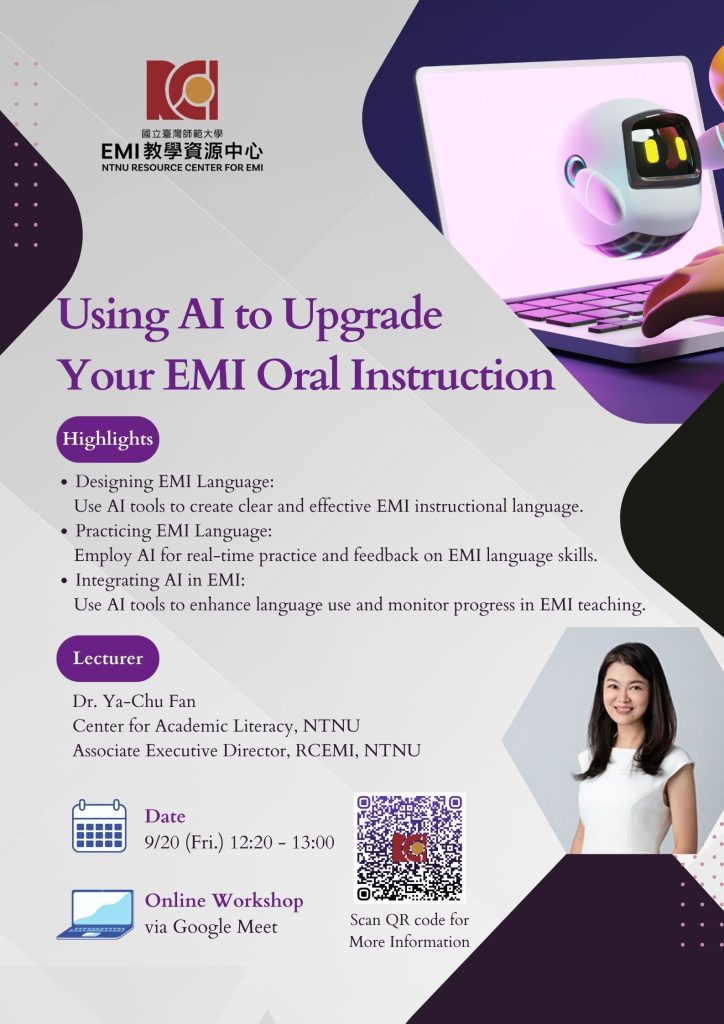
9/19 Using AI to Upgrade Your Oral Presentation
Lecturer:Dr. Ya-Chu Fan
Date:2024年9月19日(Thu.)
Time:12:20-13:20
Venue:Pu 101 & Online
Registration link
9/20 Using AI to Upgrade Your EMI Oral Instruction
Lecturer:Dr. Ya-Chu Fan
Date:2024年9月20日(Fri.)
Time:12:20-13:00
Venue:Online Workshop(via Google Meet)
Registration link
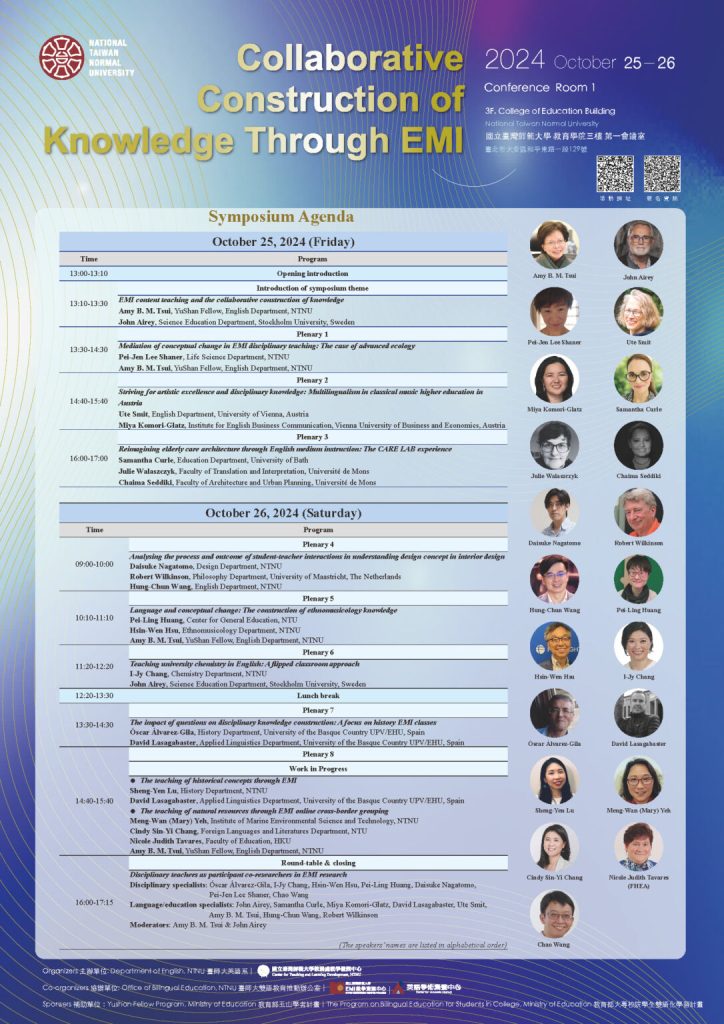
10/25&10/26 Collaborative Construction of Knowledge Through EMI
Lecturer:21 scholars from different academic disciplines and experts in the fields of language and education
Date:2024年9月19日(Thu.)
Time: 13:00-17:00 on October 25th 2024
09:00-17:15 on October 26th 2024
Venue: Conference Room I, 3F, College of Education Building No. 129, Section 1, Heping E Rd, Da’an District,
Taipei City, 106 or attend online
Registration: https://reurl.cc/QEbAbb
End date of registration: October 9th, 2024
(Website: https://sites.google.com/view/collab-through-emi/home)

The RCEMI employs two main approaches to disseminate and promote experiences. Firstly, it provides cross-university support and consultation, which began before the establishment of the center. It involves early communication with other universities’ administrative units to exchange experiences in promoting English as a Medium of Instruction (EMI). Tailored consultation services are then offered based on individual school needs. Secondly, the exchange aspect is divided into administrative and instructional dimensions. On the administrative side, strategies and management methods for EMI promotion are discussed. On the instructional side, topics include teacher professional development, instructional enhancement, effective learning, and evaluation methods such as quality assurance checks. Through the cross-university support and consultation mechanism, collaboration with other institutions helps identify and address issues related to EMI promotion. Strategies are then formulated based on the specific needs and circumstances of each institution.
To achieve these objectives, the current participating institutions in physical or online consultations at the university level include Taipei Medical University, China Medical University, University of Taipei, National Tsing Hua University, and Lunghwa University, among others. For instance, University of Taipei engaged in discussions on topics like “Expanding Bilingual Program Planning” and “EMI Teacher/Program Development,” covering various aspects of curriculum development, teacher training, EMI teacher community building, effective assessment methods for bilingual courses, EMI Teaching Assistant training, and EMI course feedback surveys.
In terms of cross-institutional collaboration, NTNU involves top-level officials such as the Vice President and Dean of Academic Affairs, along with relevant department heads, in the discussions. This ensures a comprehensive exploration of various practices and contributes to the potential future development of EMI initiatives within NTNU. Additionally, NTNU faculty members are frequently invited to share their bilingual education experiences with institutions such as National Taiwan University, National Taipei University of Education, Chung Shan Medical University, National Chung Cheng University, Chung Yuan Christian University, Tzu Chi University, National Pingtung University, National University of Tainan, and Kainan University, among others.
To facilitate quick access to expert workshop instructors in specific professional fields, the center has established an “EMI Talent Pool.” This repository includes 90 experts, comprising 27 from NTNU and 63 external professionals, including 19 designated as NTNU EMI Navigation Teachers. These experts contribute to diverse areas such as education, language, science and engineering, management, and biomedicine. The talent pool is regularly updated to meet the evolving and diverse demands of bilingual teaching.
Please refer to the compiled “EMI Talent Pool” name list for more information.
- This document presents the names, affiliations, and expertise of the instructors, while personal contact information is not provided.
- If you wish to extend invitations for lectures, please contact the relevant departments or units.
- This list will continue to be updated regularly, so please download the latest version when needed.

The EMI Teaching Empowerment Course
The EMI Teaching Resource Center (RCEMI) at National Taiwan Normal University has launched the “EMI Teaching Empowerment Course 2024 Fall” training course for this semester (2024 Fall) in alignment with the Ministry of Education’s “Bilingual Learning Plan for College Students.” (BEST) The course aims to improve the English-medium instruction (EMI) capabilities and teaching quality of lecturers across higher education institutions in Taiwan. The course adopts a combination of synchronous and asynchronous, online and in-person formats to achieve the goal of enhancing EMI practitioners’ instructional abilities.
The ” EMI Teaching Empowerment Course 2024 Fall” designed by the Center is divided into two stages: basic and advanced, to support the development of EMI courses and teaching at different levels. The basic course consists of four modules, covering topics such as the EMI teaching context (12 hours), EMI teaching methods (12 hours), EMI intercultural communication (6 hours), and EMI teaching demonstrations (6 hours), in total 36 hours. The course integrates EMI instructional design and AI technology applications, with lectures delivered by both domestic and international EMI expert instructors. The goal is to train teachers to deliver subject content in English, balancing theory and practice, and focusing on enhancing EMI teaching practices.
Participants are required to follow the course guidelines provided by the Center and complete the course to meet the course completion standards, including attending a final presentation to demonstrate their teaching. Those who complete all 36 hours will receive a “Certificate of Completion for the EMI Teaching Empowerment Course.” Those who do not meet the 36-hour requirement will be issued a certificate of attendance by the Center.
I. Eligibility
All full-time (including contract) and part-time instructors in tertiary institutions are eligible to apply to the program. The order of priority of the applicants is as follows:
- Those who will participate in the Final Presentation on Wednesday, June 26th, 2024, as RCEMI requires.
- Those who teach EMI courses in 113-1 (2024 Fall) semester and 113 academic year.
II. Application Process
- Online Application form
- Applications are accepted through individual online registration, with priority given to early registrants. Late applications will not be considered.
- Registration time: From Aug. 22, 2024 to Sep. 27, 2024.
- The successful applicants will be informed by email on Oct. 8, 2024.
III. Implementation Guidelines
- All participants in this course can access to Moodle, the learning platform of NTNU, and the Sensay AI English Speaking Platform. To achieve the course completion requirement, participants must complete the following module tasks, totaling 36 hours.
- The Sensay AI English Speaking Platform is only available to those who wish to obtain the certification of completion of ” The EMI Teaching Empowerment Course 2024 Fall”.
- All online workshops, seminars, and the Final Presentation will be recorded. By registering for this course, participants agree to the recording and the use of their likeness by our Center.
4 Modules are included:
Module 1: EMI context (12 hrs)
Module 2: EMI pedagogy (12 hrs)
Module 3: Intercultural communication (6 hrs)
Module 4: EMI teaching demonstration (6 hrs)

- The course is divided into video lectures and online seminars. Participants are required to fully watch 4 video lessons (4 hours) and attend at least 8 hours of online seminars.
- Participants can select the sessions they wish to attend in the registration form. Attendance will be recorded at each session. If you need to adjust your session attendance during the course, please make sure to notify the Center by email.
Course Schedule:
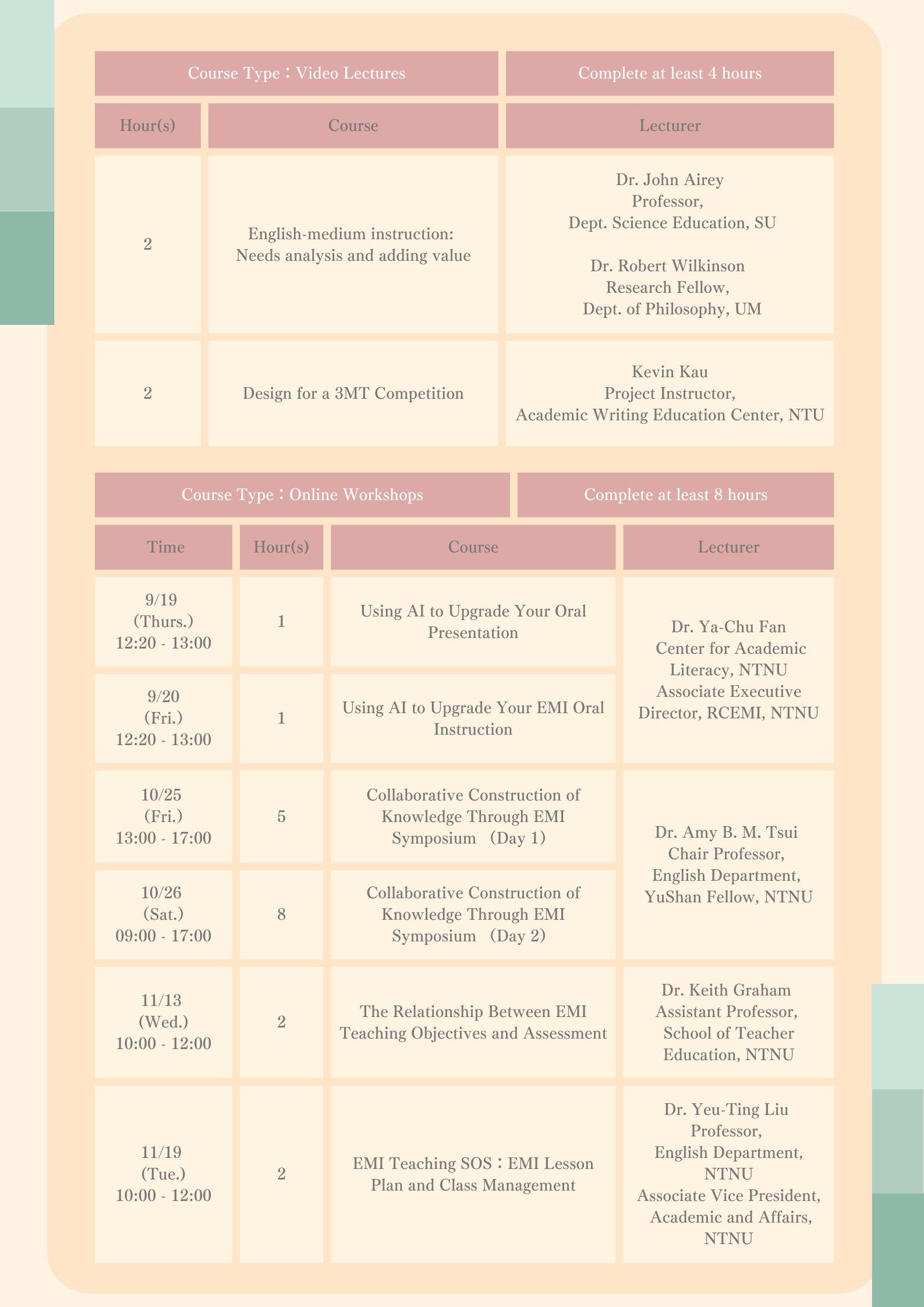
- This module was developed in close collaboration with the American Institute in Taiwan (AIT). It features international EMI experts who lead discussions to help local teachers understand the foundational concepts and teaching strategies of EMI.
- The module consists of video lectures and online seminars (as shown below). Participants are required to select and watch 3 videos from the video lessons (totaling 6 hours) and attend three live online seminars (totaling 6 hours).
- Participants can select the sessions they wish to attend in the registration form. Attendance will be recorded at each seminar. If you need to adjust your session attendance during the course, please make sure to notify the Center by email.
Course Schedule:
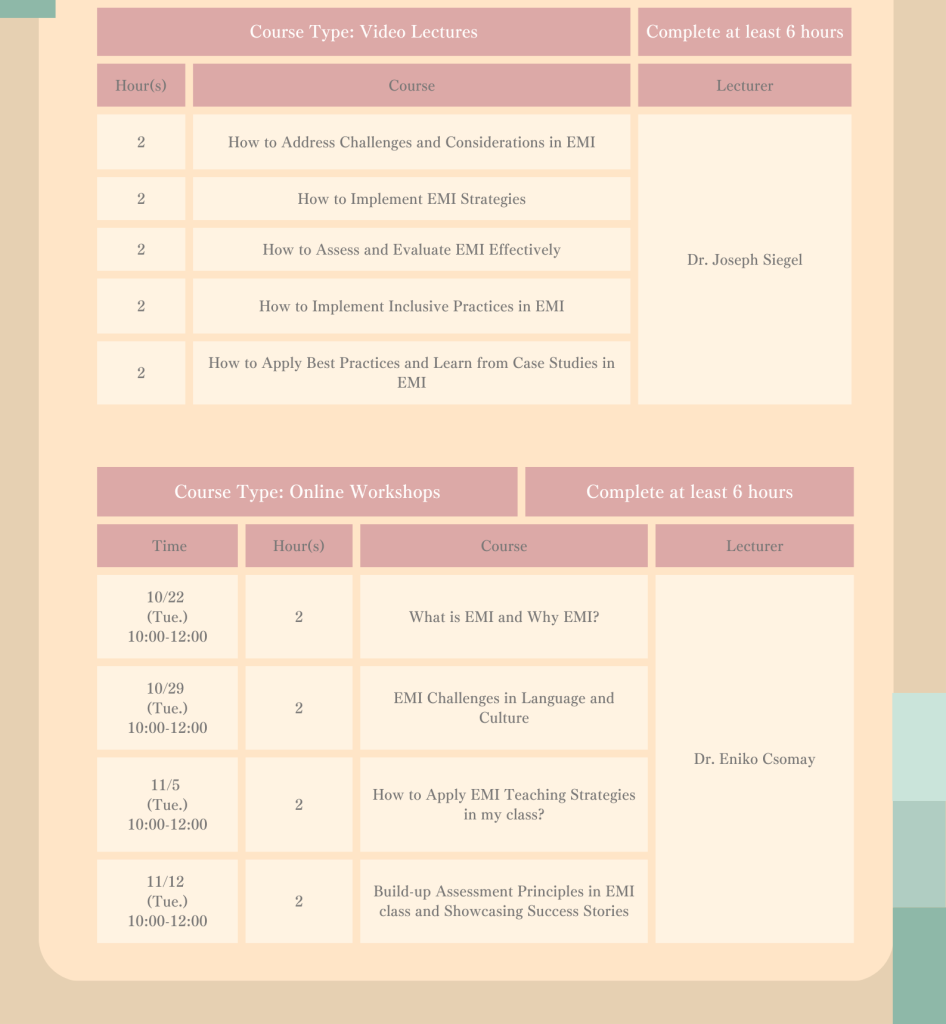
To reinforce participants’ English-speaking proficiency in EMI context, they are required to complete AI speaking exercises (totaling 4.5 hours) at Sensay AI Speaking Platform and based on the sessions they attend.
There are post-quizzes for video lectures in module 1 and 2. After watching the videos, participants can complete the quizzes at their convenience, with their highest score recorded (0.5 hours). We also design a “Peer Editing” activity, encouraging participants to engage in cross-disciplinary interaction on the Moodle learning platform (1 hour).
The completion deadline for each course module is one week after each session. If participants are unable to complete the speaking exercises and quizzes within the given timeframe, they may do so by the final makeup deadline on Friday, November 29, 113, at 23:00. Please note that exercises completed after this deadline will not be counted.
Our center will host a “Final Presentation” on Saturday, December 7, 2024. All participants of this semester’s EMI Professional Development Course are required to attend the entire 6-hour presentation, which includes a 15-minute teaching demonstration and lesson observation. The teaching demonstration guidelines are as follows:
- Teaching Video Submission:
- Participating instructors must record a 10 to 15-minute teaching video in English, either from their in-person or synchronous online course.
- If recording a video is not possible, instructors may conduct a live teaching demonstration on Dec. 7 for 15 minutes, followed by 5 minutes of Q&A.
- Submission Deadline:
- Each participant must submit an EMI lesson plan and the teaching video by Friday, November 29, 2024, at 11:00 PM.
- The lesson plan format should follow the template provided by our center.
- Teaching Demonstration Requirements:
- The instructor must deliver the class in English.
- The instructor should guide students to participate in-class activities in English.
- The instructor should provide immediate feedback to students in EMI class.
- Teaching Materials and Methods:
- Instructors should select their teaching materials and utilize multimodal learning resources, such as subject-related teaching aids, presentation slides (PPT), digital tools, body language explanations, etc.
- These resources should be integrated into learning strategies like lecture-based learning, cooperative learning, and flipped classroom approaches, and detailed in the lesson plan.
- Presentation Format:
- (1) For pre-recorded videos: The presenter will play the course video during the Final Presentation and simultaneously explain the course design, strategies used, and course outcomes. The last 5 minutes will be open for Q&A and interactive discussion with the participants.
- (2) For live demonstrations: The presentation must meet the above conditions, and the lesson plan must be submitted by the deadline.
- Lesson Observation:
- In addition to the teaching demonstration, each participating instructor must also attend lesson observations, watching at least two other instructors’ demonstrations, asking questions, and filling out observation records.
- Video Requirements:
- (1) The video should be filmed in landscape mode.
- (2) The content must clearly show the interaction between the instructor and the students.
- Expert Feedback:
- In addition to sharing their learning outcomes, participants will have their demonstrations observed by EMI experts, including field specialists and trained instructors.
- One-on-one feedback and guidance will be provided after the session. The schedule for each participant’s demonstration will be announced separately, and the presentation content will be posted on our center’s website for reference.
Should you have any questions, please contact:
- Abbie Lee, Program Development Manager
- Tel: 02-7749-7084
- Email: rcemi@deps.ntnu.edu.tw

The National Taiwan Normal University (NTNU or “the University”) Resource Center for EMI (“the Center”) has formulated the following regulations to encourage college and university instructors to form professional communities of EMI instructors to enhance instructors’ competence and improve teaching quality through the promotion of peer learning, experience sharing, materials design, and research and development.
National Taiwan Normal University
Resource Center for EMI
Grant Regulations for Professional Learning Community of EMI Instructors
2024.08.15 Passed during the General Meeting of the Resource Center for EMI
Purpose
The National Taiwan Normal University (NTNU or “the University”) Resource Center for EMI (“the Center”) has formulated the following regulations to encourage college and university instructors to form professional communities of EMI instructors to enhance instructors’ competence and improve teaching quality through the promotion of peer learning, experience sharing, materials design, and research and development.
Community Categories
- EMI Teaching Community : Must consist of instructors with EMI teaching experience. Participating instructors are required to complete the course plan for the EMI course they intend to offer, conduct trial teaching, and perform open teaching sessions for classroom observation activities.
- EMI ESAP Syllabus Development Community : Must consist of instructors with EMI teaching experience. Participating instructors are required to complete the syllabus for the professional academic English course (ESAP) they intend to offer and conduct open teaching demonstrations for classroom observation activities.
Requirements
- The EMI Teacher Professional Community is recommended that a convenor with EMI teaching experience or EMI certificate apply. The convenor will be mainly responsible for coordinating, planning, contacting, and compiling the relevant results of the teacher community.
- The Center will hold a consensus meeting for conveners after announcing the subsidy list to help conveners of each community have a deeper understanding of the operating model of professional teacher communities.
- Each community must consist of at least two instructors with EMI teaching experience or those intending to teach in EMI in the future. Each instructor may only join one community.
Application Procedures and Review Principles
- All information is announced on the website of the Center.
- The conveners are requested to adhere to the timeline outlined in the guidelines for Professional Learning Community of EMI Instructors provided by our center. Please complete and upload “Attachment 1: Application Form” and “Attachment 2: Reimburse Application Form“ to the online application platform.
- Grant applications shall be reviewed by experts and scholars invited by the Center.
- Grant amounts shall be reviewed and determined based on the objectives and prospective benefits of the community plan (including benefits to instructors’ teaching and students’ learning), the community operating models and mechanisms, the feasibility of the plans, and the implementation status of previous plans (optional).
- After completion of the review, conveners will be notified of the results of communities receiving grants and the grant amounts by email.
Program Schedule and Financial Aid
- The application schedule, implementation schedule, and date of the outcomes presentation session shall be determined and announced by the Center based on actual circumstances in the given year.
- The maximum grant for each application shall be NT60,000. The number of communities receiving grants and grant amounts shall be determined based on the allocated budget of the given year. In case of a budget cut or freeze, the Center may suspend the grants or reduce the grant amounts.
- Grants may only be used toward administrative fees. Grant items shall be detailed separately in the application form.
- The relevant reimbursement request is conducted in two periods:
- October 14, 2024 (Monday) to October 31, 2024(Thursday): Accept the relevant reimbursement request for community activities conducted between September 9, 2024 (Monday) to October 31, 2024 (Thursday).
- November 18, 2024 (Monday) to November 29, 2024(Friday): Accept the relevant reimbursement request for community activities conducted between November 1, 2024 (Friday) to November 29, 2024 (Friday).
- All requests for reimbursement shall be sent in by registered mail or submitted in person, the postmark date on the envelope will be regarded as the date of application. If fund disbursement cannot be completed as scheduled, the Center shall withdraw the remaining grant amount.
Outcomes
- For the EMI teacher professional community project, please choose one theme from “Curriculum Design, Teaching, and Assessment” and arrange your community plan on the basis of “12 weeks: September 9, 2024 (Monday) to November 29, 2024 (Friday) ” (see application form for further details) .
- Each community must organize observation activities proportionate to the number of participants. Every community activity must be attended by all community members. Activities shall be documented with photographs and an event log, which shall be presented at the outcomes presentation session.
- The planning of teacher community activities must invite at least one community-organized activity must invite EMI experts Educators, EMI pilot Educators or Oxford Certified EMI seed Educators to participate. For example, community activities can invite EMI experts to give speeches, and the topics of the speeches can be determined based on the professional development needs of community members; EMI pilot teachers or EMI teachers can also be invited to participate in class observation and discussion activities. In this activity, community members provide their own teaching videos, lesson plan designs, designed worksheets, learning assessment methods and other materials, allowing community members to conduct discussions with EMI pilot teachers or EMI seed teachers to promote the improvement of EMI teaching capabilities. .
- The Center will be holding EMI teaching-themed workshops and lectures in September and October 2024, and each community teacher must attend at least one of these workshops and lectures organized by the Center (including online participation).
- Instructors in professional communities that receive grants shall participate in the Professional EMI Teaching Community Outcomes Presentation Sessions organized by the Center, during which they shall publicly share their project outcomes. Participation in the Center’s instructor development activities such as speeches, research presentations, and curriculum discussing is also encouraged.
- The content of project outcomes reports shall be consistent with the projected outcomes given in the respective application forms. Reasons for any discrepancy or failure to achieve the projected outcomes shall be stated in the outcomes report.
- Community conveners shall submit an outcomes report by 16:00 on November 29, 2024 (Friday) (including the outcomes report, photos, and other relevant documents).
- The event logs and outcomes reports of all communities shall be made available on the Center’s website for non-profit uses or academic promotion.
EMI Teacher Professional Community Program Completion Standards
- Observation activities proportional to the number of participants must be conducted within the 12-week project period, and community members are expected to attend as much as possible.
- Invite EMI experts, EMI pilot teachers or EMI seed teachers to participate in at least one community event.
- Each community teacher must attend at least one EMI teaching online lecture conducted by the center.
- Each community shall submit an outcomes report.
- Every community teacher shall participate in the Professional EMI Teaching Community Outcomes Presentation Sessions organized by the center and publicly share and present the community outcomes in an electronic version of the outcome report.
- Community conveners should compile and submit activity logs, reimbursement requests, checklists, and other relevant information in time.
Supplementary Provisions
- Applicants for this grant may not concurrently apply for other professional teaching community grants from other EMI resource centers. Verified violators will have their grant revoked by the Center.
- Instructors who receive grants shall uphold professional academic integrity and may not act in a manner that contravenes the applicable intellectual property laws and the Personal Data Protection Act.
- This grant shall be funded by the National Taiwan Normal University Resource Center for EMI grant. When requesting reimbursements, expenses shall be reported truthfully and in accordance with the Principles of Subsidy and Fund Use for the Program on Bilingual Education for Students in Colleges and Universities and the Funding Standard Table for Donations, Subsidies, and Sponsored Projects of the Ministry of Education.
- The Regulations shall be promulgated and come into effect upon passage by the General Meeting of the Resource Center for EMI. The same shall apply to future revisions
Contact
- Choon-Yap, Chong
- tel: 02-7749-7082
- email: ntnurcemi@gmail.com
Application Process
- Please complete and upload “Attachment 1: Application Form” and “Attachment 2: Reimburse Application Form” to the online application platform by Thursday, September 5th, 2024.
- Applications submitted with missing information or in an incorrect format will not be accepted.
01 Regulations for Professional Learning Community of EMI Instructors
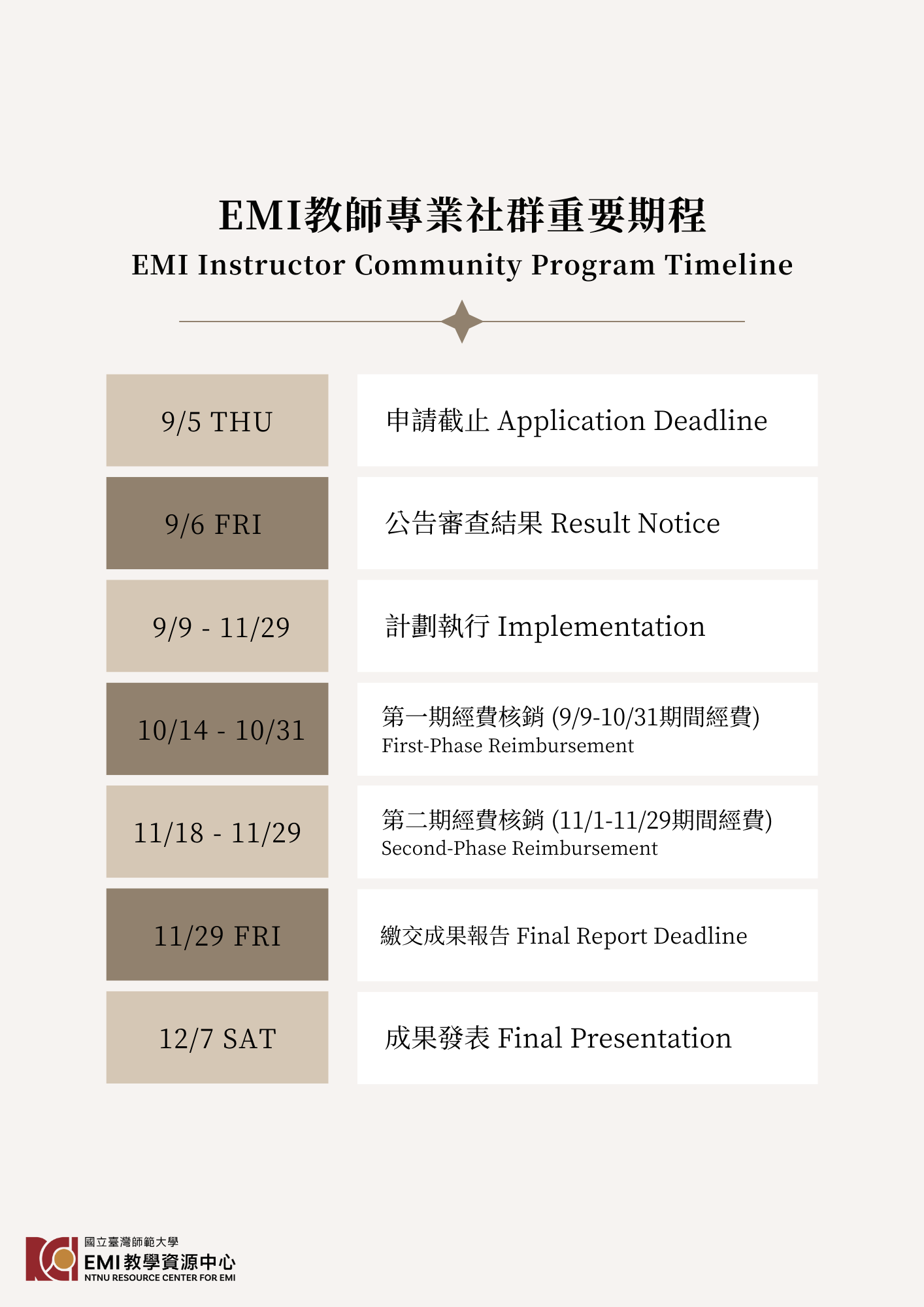
Application Period
From now on to Thursday, September 5th, 2024.
Application Result
To be announced via email on Friday, September 6th, 2024.
Community Event Implication (The Grant Period)
From Monday, September 9th to Friday, November 29th, 2024.
Reimbursement
-
Please scan the sign-in sheet and receipts, attach them to the event log (in DOC/DOCX format), and email the file to the case clerk, Ms. Lo (vivianne@ntnu.edu.tw) within 12 days of the end of the event, with “Event Log for Professional EMI Instructor Community of Practice_[Event Date]_[Convener’s Name and Name of Affiliated University/College]” as the subject line.
-
Upon receipt of the verification email from the case clerk, enclose the original copies of the documents in an envelope titled “Event Log for Professional EMI Instructor Community of Practice” and address it to the National Taiwan Normal University Resource Center for EMI (Room 102 of the College of Liberal Arts, Pu Building), No. 162, Sec. 1, Heping E. Rd., Da’an Dist., Taipei City 106.
Submission of Outcomes Report
To be submitted by Friday, November 29th, 2024, within one week after the grant period.
Final Presentation (Physical)
Saturday, December 7th, 2024. (The exact time is to be announced on the RCEMI website)
Please refer to our EMI Expert Database for more EMI professionals and recommended speakers.
- This file only presents the name, affiliation, and expertise of the EMI experts.
- If you would like to invite one of the EMI experts for a speech, please contact their affiliation/institute.

The Academic Literacy Talent and Leadership Course
RCEMI is responding to the increasing demand for EMI teaching assistants due to the active expansion of EMI courses in various colleges and universities. The Center will continue its EMI TA Professional Development Program, which has been implemented in the past, through the “EMI Basic Skills Training Course” and the “EMI TA Training Course.” By providing “EMI TA Talent and Leadership Courses”, both synchronously and asynchronously online, students will have the opportunity to learn and deepen their professional teaching skills as EMI teaching assistants without geographical limitations, thus becoming bilingual professionals in their respective fields. Simultaneously, through resource sharing and collaborative exchanges, the Center aims to enhance the teaching momentum of EMI courses in various colleges and universities and improve student learning outcomes.
Targeted Students:
- Undergraduate and graduate students from various colleges and universities are eligible to apply.
- Students who have completed EMI courses, served as EMI Teaching Assistants (TAs), or wish to enhance their EMI course participation skills and improve their EMI TA abilities are welcome to apply.
Registration Period:
From now until March 8, 2024 (Friday) at 12:00 PM
Note:
- Only online individual registration will be accepted. Late registrations will not be accepted.
- Applicants may provide the name and contact information of a recommending teacher on the application form. In cases of a large number of applicants, those who submit a list of recommended teachers on the application form will be given priority.
Registration Links
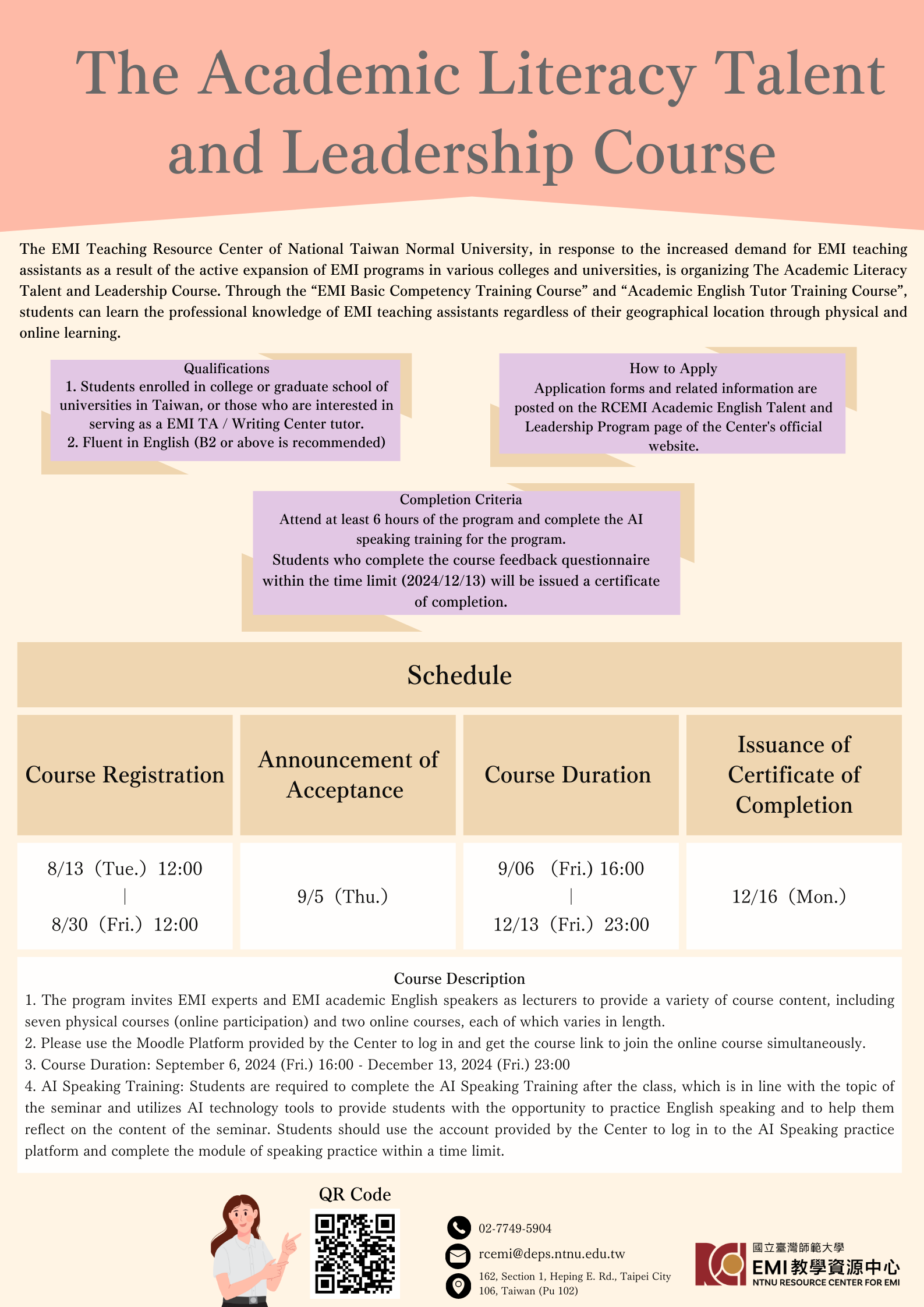
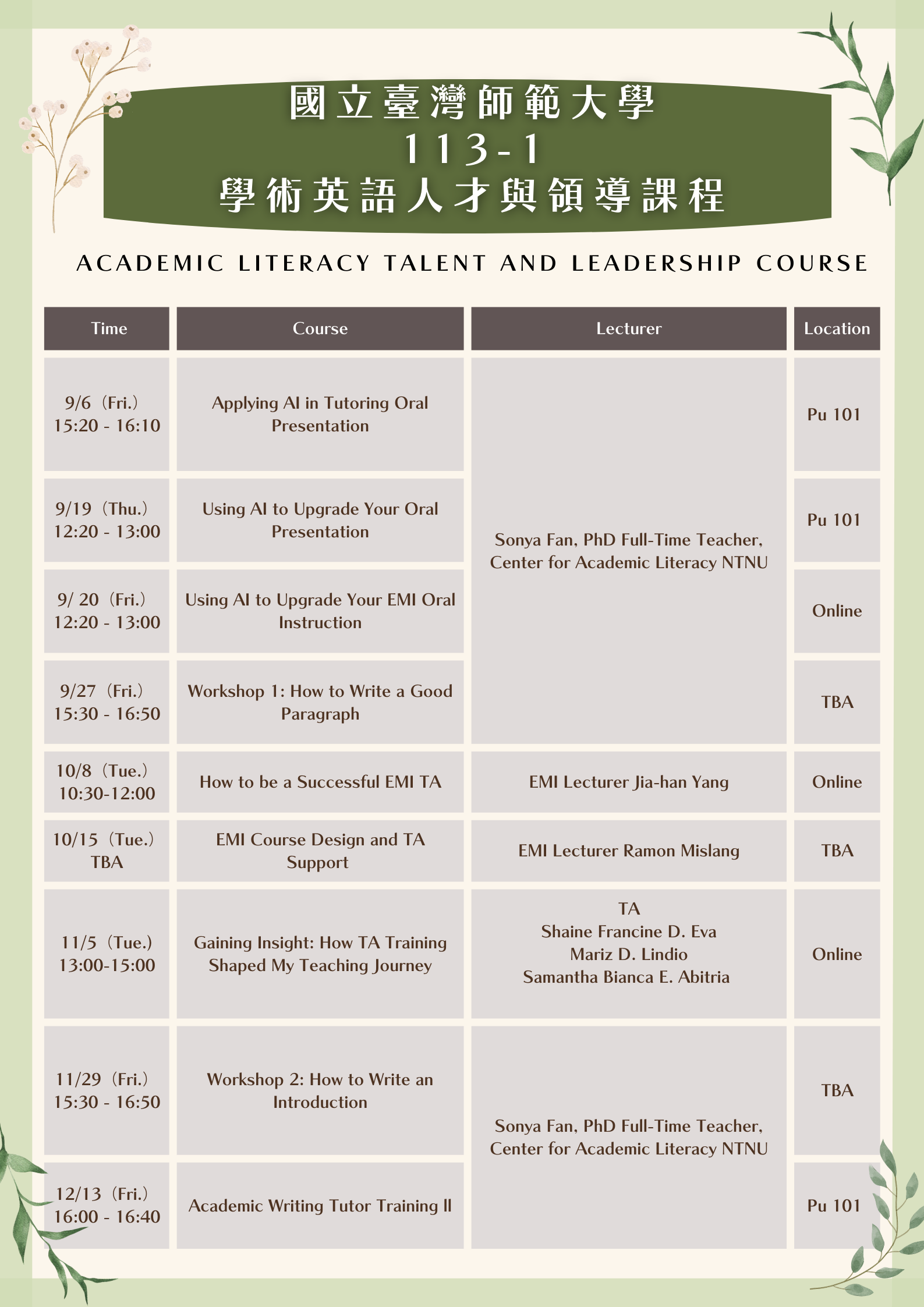
- Yi-Chien Wu
- Tel: 02-7749-5904
- Email: rcemi@deps.ntnu.edu.tw

本中心推動 EMI 教師培訓計畫以來,已培訓國內數百位EMI教師取得證書,有鑑於已具備部分專業教學技巧的教師需要更進階的培訓,為回應臺灣EMI教師的需求,故本中心與美國德州大學奧斯汀分校 (The University of Texas at Austin, UT Austin) 洽談客製化暑期移地培訓課程,內容涵蓋觀摩 UT Austin 領域教師授課、工作坊、教案試教、回國後教案執行與成果追蹤。
暑期培訓期程
113年 7月 21日(日)至 8月3日(六),共 14 天。
實施對象
國立臺灣師範大學 EMI 教學資源中心之夥伴學校教師。
名額
20名,最終推薦名單由本校組成的遴選委員會討論決議。
報名及推薦流程
- 自即日起至4月中旬,隨到隨審,額滿為止,各大專院校系所至多推薦一名EMI教師為原則。
- 推薦教師填妥推薦表資料,本人簽章並經推薦單位主管核章後,上傳掃描檔併同開設EMI課程大綱與參與目的說明影片連結至線上表單。
- 本校將組成遴選委員會,審核各單位推薦教師資格,預計於 4 月 18 日(四)公告選送名單。
- 詳細資訊將公告於本中心網頁上,請參考最新計畫辦法
遴選審查項目
- EMI 課程設計(含曾/欲開設之課程,50%):檢附課程大綱(課程目標10%、教學設計20%、評量設計20%、學生分析10%)
- 參與目的說明(purpose of statement)(50%):繳交一段錄製影片,說明參與動機與期望(三分鐘內以全英文進行,提供影片檔案連結)。
- 其他加分項(可累加):為臺師大專家人才教師庫夥伴、回流講師、曾參加臺師大RCEMI增能活動(含課程、工作坊、講座與社群)。
選送義務
- 培訓前
- 教師需於 7月5日前完成 3-6 小時欲開設 EMI 課程教案,並將此教案於培訓課程中,進一步開發並執行試教
- 培訓後
- 持續四個月與UT Austin導師進行課程發展
- 擔任 EMI 顧問教師(列入本中心EMI專家人才庫)
- 擔任 EMI 工作坊講師
- 擔任公開觀課的議課老師
- 參與培訓成果發表會
- 一年內參與本中心計畫組成跨校EMI專業教師社群
- 培訓前
培訓計畫補助項目
- 套裝課程,包含:
- 行前線上共識會議
- 語言能力課程
- 完整EMI培訓課程(包含觀課、討論、實作、教案設計、演示、分享)
- 工作坊
- 文化活動
- 成果追蹤(持續四個月每月進行一次線上會議提供教師支持與指導課程規劃)
- 不包含:
- 日支費:請教師自行向各校雙語教育推動辦公室或相關計畫申請。
- 行程套裝(包含住宿、一天三餐、機場接送):$1,000 美元(若指定單人房為$1,500 美元)
- 來回機票
- J-1簽證的簽證申請費
- 個人消費
主辦單位
國立臺灣師範大學 EMI 教學資源中心(rcemi@deps.ntnu.edu.tw)
計畫連絡人
國立臺灣師範大學 EMI 教學資源中心 黃雨晴小姐 (02)7749-5922
培訓課程與資源
- 行前線上培訓:培訓將包括同步和非同步的線上課程,旨在提升參與者在教學方面的文化意識。
- 移地訓練:培訓教師將參觀 UT Austin 教學設施與相關領域教學場域,並參與完整3堂課程、4場工作坊及文化活動,每位參與者將發表自己的課程計畫,完成培訓者將授予培訓證書。(參與者的課程計劃將被上傳到Canvas學習管理系統中並在小組間共享。)
- 語言能力課程:會有兩堂暖身課程,由專業ELC教師帶領,目標聚焦在溝通、學術素養、整體語言能力,透過此課程評估教師語言程度,幫助參與培訓教師準備好進入正式的課程。
- 完整EMI培訓課程(包含觀課、討論、實作、教案設計、演示、分享):參與培訓教師將至 UT Austin 專業領域教師課堂觀察其授課情形,接著透過小組參與討論和分析如何將觀察所得應用於自己 EMI 課程中。課程活動將引導參與教師應用從觀課中學到的教學技巧或方法創建自己的教案,進行試教,並共享課程的計畫與分享反饋。
- 工作坊:培訓教師參加4個不同領域主題之工作坊了解當前教學趨勢。
- 文化活動:為增進參與者對於美國生活和英語理解的深度,設計每週一次文化活動,可能包括參觀奧斯汀的歷史地點,如:德克薩斯州議會大廈、林登.貝恩斯.約翰遜總統圖書館和德克薩斯州歷史博物館。
- 成果追蹤:培訓教師回國後須分享課程計畫並錄製教學上傳,UT 培訓師將提供反饋,並持續四個月每月進行一次線上會議提供教師支持與指導課程規劃。
- UT Austin 培訓課程內容敘述詳附件一。
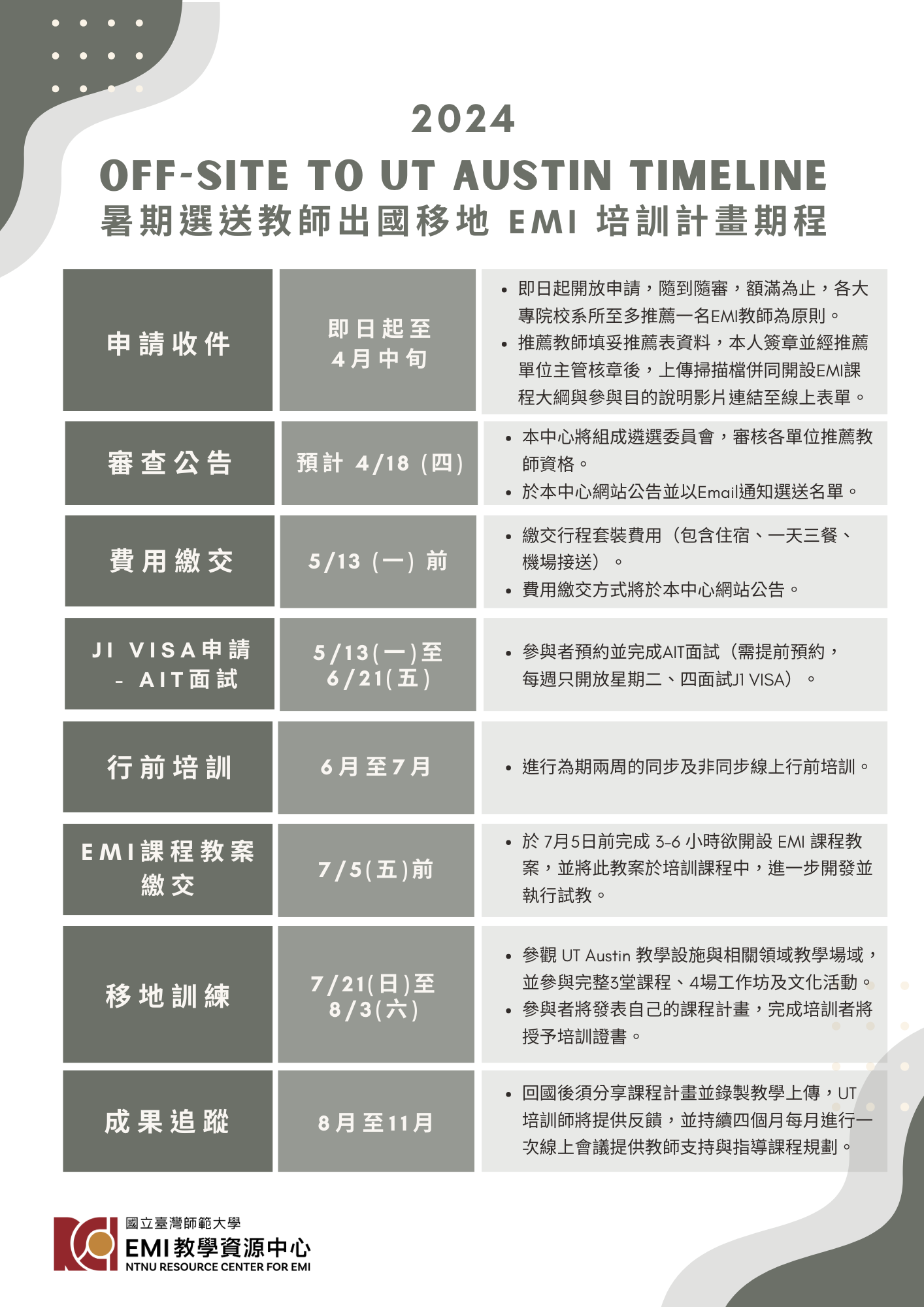
Should you have any questions, please contact:
- Tel: 02-7749-5922
- Email: rcemi@deps.ntnu.edu.tw

時間:2024年6月26日(星期三)8:30-16:30
地點:國立臺灣師範大學 圖書館校區 教育大樓
※ 詳細資訊待更新 ※
※ 各發表人發表場次及時間將於6月前以郵件通知 ※
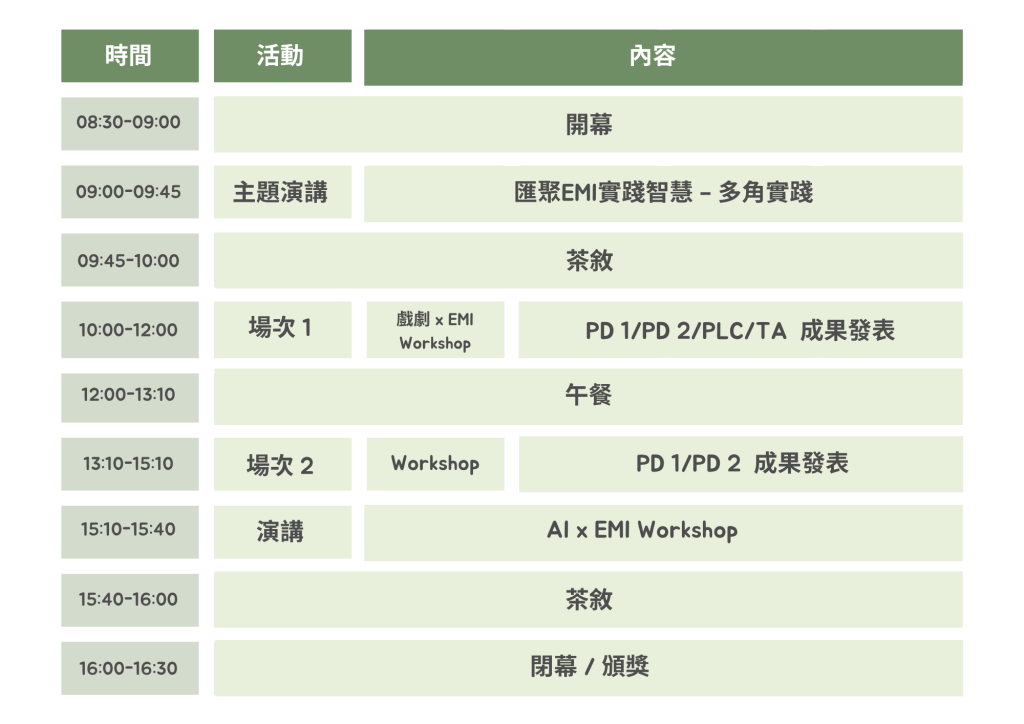

時間:2024年6月26日(星期三)8:30-16:30
地點:國立臺灣師範大學 圖書館校區 教育大樓
※ 詳細資訊待更新 ※
※ 各發表人發表場次及時間將於6月前以郵件通知 ※

112學年度 介紹影片
112-1 EMI TA Online Training Course
活動紀錄
Frequently Asked Questions for RCEMI
Instructors
A-1: NTNU Faculty: Please refer to the Center for Teaching and Learning Development (CTLD).
A-2: Non-NTNU Faculty: Currently, NTNU RCEMI is only open to interuniversity collaborations. For faculty interested in the Professional EMI Lecturer Development course, please contact the EMI unit at your post-secondary institution of employment.
A: The time and procedures for applications are based on the latest announcements. There are no restrictions on membership concerning specialization or NTNU affiliation. The application period for each year will be communicated in actual announcements. A minimum of 4 members is required.
A: Currently, NTNU RCEMI is only open to interuniversity collaborations. For faculty interested in the Professional EMI Lecturer Development course, please contact the EMI unit at your post-secondary institution of employment.
For EMI representatives of other post-secondary institutions, please contact NTNU RCEMI at rcemi@deps.ntnu.edu.tw.
A: NTNU RCEMI will hold lectures and workshops on an irregular basis. They will be open to all faculty members and announced on our website or via email. Please stay tuned for updates.
A: EMI courses can improve students’ professional and academic English skills, giving them a competitive edge in a globalized economy. EMI teaching practices can also improve English teaching expression and communication skills for all faculty, which is of great benefit when participating in international academic exchanges and publications.
For more details about the Oxford EMI program, please refer to our FAQs for Oxford EMI Training, or contact the project coordinator Lili Yeh (TEL: 02-7749-5922 / Email: liwenyeh@ntnu.edu.tw)
Students
A: English Mediated Instruction (EMI) refers to a type of course offered by educational institutions for which English is not the native language of instruction. In EMI courses, the delivery of course contents, teacher-student interactions, and academic support materials, as well as the presentation and evaluation of learning outcomes are conducted in English.
A1-NTNU Students: Under the NTNU Teaching Assistant Implementation Directions and Teaching Assistant Training and Assessment Principles, the EMI course must be completed before applications can be submitted to CTLD. For more information, please contact CTLD at extension #1887.
A2-Non-NTNU Students: Currently, NTNU RCEMI is only open to interuniversity collaborations. For students interested in the EMI TA Training course, please contact the EMI unit at your post-secondary institution of enrollment.
A: TAs are required to assist the professor in-class activities and other tasks. Their duties are similar to that of TAs in Chinese courses, except EMI TAs also need to lead group discussions or make announcements in English.
A: All students interested in studying for and working as EMI. TAs are welcome to apply, with specific details subject to the regulations of their school. For instance, prerequisites for NTNU are completion of the English course and 3-stage training. For more information, please contact CTLD at extension #1887.
A: Students’ EMI course credits or completion rate will be noted on their transcript along with their English certification level (E1-E5), which serves as strong evidence of proficiency for studying abroad or seeking employment in the future. For more information, please contact the Registrar’s Office at extension #1102.
A: NTNU EMI courses are distributed across all departments and graduate institutes. Please refer to the course selection system for a complete list.
A: In addition to basic English courses, the NTNU Foreign Language Education Division (FLED) also hosts English Professional Development events on an irregular basis. For more information, please contact FLED at extension #1148.
Furthermore, the Center for Academic English (CAL) helps improve academic English from an undergraduate to a doctorate level. For more information, please contact CAL at extension #5902.
A: CAL offers professional courses, one-on-one counseling, workshops, lectures, and other events, as well as a collection of books, software, and glossaries on English academic writing and oral communication for self-learning. For more information, please contact CAL at extension #5902.
Team Members

Executive Officer of RCEMI
Mei-Hui Liu, Chief Executive Officer of RCEMI
- TEL: 02-7749-1089
- Email: lium@ntnu.edu.tw
Associate Executive Officer of RCEMI
Yeu-Ting Liu, Associate Executive Officer of RCEMI
- TEL: 02-7749-5909
- Email: yeutingliu@ntnu.edu.tw
Ya-Chu Fan, Associate Executive Officer of RCEMI
- TEL:02-7749-5901
- Email:sonya.fan@ntnu.edu.tw
Project Managers
Yu-Ching Huang, Project Manager
- TEL: 02-7749-5922
- Email: huangyuching@ntnu.edu.tw
Choon-Yap Chong, Project Manager
- TEL: 02-7749-7082
- Email: potato0710@ntnu.edu.tw
Yi-Chien Wu, Project Manager
- TEL: 02-7749-5922
- Email: yichien0317@gapps.ntnu.edu.tw
Chia-Yu Lee, Project Manager
- TEL: 02-7749-7084
- Email: abbielee@gapps.ntnu.edu.tw
Chi-Ju Lin, Project Manager
- TEL: 02-7749-7083
- Email: chiju.lin@gapps.ntnu.edu.tw
For business contact, please email our team for further discussion: rcemi@deps.ntnu.edu.tw
